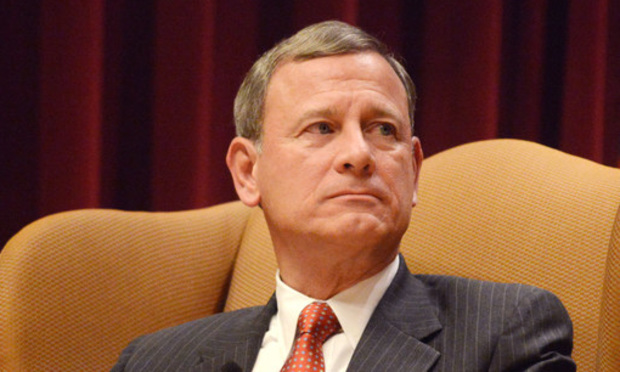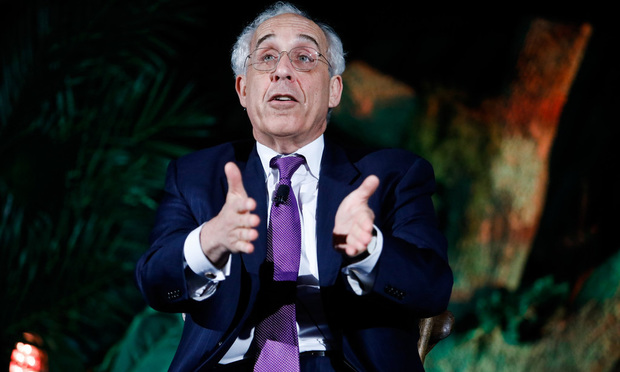Roberts Delivers Latest Pro-Arbitration Ruling for Divided Court
Ginsburg said in dissent: “I write separately to emphasize once again how treacherously the court has strayed from the principle that 'arbitration is a matter of consent, not coercion.'”
April 24, 2019 at 01:10 PM
4 minute read
 Chief Justice John Roberts Jr. Credit: Rick Kopstein
Chief Justice John Roberts Jr. Credit: Rick Kopstein
The U.S. Supreme Court on Wednesday wrapped up its arbitration docket for the current term with a 5-4 decision that is a win for business and favors individual over class arbitrations.
The ruling in Lamps Plus v. Varela was the second pro-arbitration ruling this term, joining Schein v. Archer and White Sales in the Supreme Court's longstanding trend of strengthening the Federal Arbitration Act against attack by consumer groups that view arbitration as a one-sided process working against employees. Both cases were argued on Oct. 29. Schein was decided in January.
New Prime v. Oliveira, the third arbitration case decided this term by the court, was a rare win for consumers, giving judges more power to decide whether arbitration can proceed in certain circumstances.
Chief Justice John Roberts Jr. wrote for the majority in the Lamps Plus case, overturning a decision by the U.S. Court of Appeals for the Ninth Circuit that allowed a class arbitration to proceed because the arbitration agreement at issue was ambiguous. Roberts wrote that, under the arbitration statute, an ambiguous agreement cannot be interpreted as allowing class arbitrations.
The lighting company was hacked in 2016, exposing tax information about 1,300 employees. Frank Varela, one of the employees, filed suit on behalf of a putative class, but the company pushed back, seeking individual rather than class arbitration.
The company, Roberts wrote, “sought an order compelling individual arbitration. What it got was an order rejecting that relief and instead compelling arbitration on a class-wide basis.” That shift, he continued, “sacrifices the principal advantage of arbitration” and “greatly increases risks to defendants.”
The decision was a win for Andrew Pincus of Mayer Brown, who represented Lamps Plus and also argued in AT&T Mobility v. Concepcion, the 2011 ruling on class arbitrations that Roberts cited in the Lamps Plus ruling. Michele Vercoski, partner at McCune Wright Arevalo in California, represented Varela.
 Andrew Pincus of Mayer Brown. (Photo: Diego M. Radzinschi/ ALM)
Andrew Pincus of Mayer Brown. (Photo: Diego M. Radzinschi/ ALM)Lauren Novak, a partner at Schiff Hardin, said the ruling is “a clear win for employers. The decision is important, because it means that employers will maintain the benefits of individual arbitration and avoid the risks of class arbitration unless they agree to it.
Rusty Perdew of Locke Lord said Wednesday: “This decision will make it easier for parties who have an arbitration agreement to stop class actions filed in court and compel individual arbitration. Only agreements that clearly permit arbitration on a class basis will allow either party to force the other party into a class-action arbitration procedure.”
The court's four liberals—Justices Ruth Bader Ginsburg, Stephen Breyer, Sonia Sotomayor and Elena Kagan—wrote separate dissents.
Using unusually strong language, Ginsburg said, “I write separately to emphasize once again how treacherously the court has strayed from the principle that 'arbitration is a matter of consent, not coercion.'”
Read more:
Sen. Whitehouse: There's a 'Crisis of Credibility' at the U.S. Supreme Court
Writing Styles of Gorsuch and Kavanaugh Revealed in Arbitration Rulings
Gig Economy Plaintiffs Will Test-Drive New SCOTUS Ruling Against Arbitration
This content has been archived. It is available through our partners, LexisNexis® and Bloomberg Law.
To view this content, please continue to their sites.
Not a Lexis Subscriber?
Subscribe Now
Not a Bloomberg Law Subscriber?
Subscribe Now
NOT FOR REPRINT
© 2025 ALM Global, LLC, All Rights Reserved. Request academic re-use from www.copyright.com. All other uses, submit a request to [email protected]. For more information visit Asset & Logo Licensing.
You Might Like
View All
American Bar Association Calls for Enforceable Supreme Court Ethics Code


Fired by Trump, EEOC's First Blind GC Lands at Nonprofit Targeting Abuses of Power
3 minute read
‘What’s Different About Jarkesy?’ 5th Circuit Weighs if FCC Forfeiture Order Is Constitutional
Trending Stories
- 1Public Notices/Calendars
- 2Wednesday Newspaper
- 3Decision of the Day: Qui Tam Relators Do Not Plausibly Claim Firm Avoided Tax Obligations Through Visa Applications, Circuit Finds
- 4Judicial Ethics Opinion 24-116
- 5Big Law Firms Sheppard Mullin, Morgan Lewis and Baker Botts Add Partners in Houston
Who Got The Work
J. Brugh Lower of Gibbons has entered an appearance for industrial equipment supplier Devco Corporation in a pending trademark infringement lawsuit. The suit, accusing the defendant of selling knock-off Graco products, was filed Dec. 18 in New Jersey District Court by Rivkin Radler on behalf of Graco Inc. and Graco Minnesota. The case, assigned to U.S. District Judge Zahid N. Quraishi, is 3:24-cv-11294, Graco Inc. et al v. Devco Corporation.
Who Got The Work
Rebecca Maller-Stein and Kent A. Yalowitz of Arnold & Porter Kaye Scholer have entered their appearances for Hanaco Venture Capital and its executives, Lior Prosor and David Frankel, in a pending securities lawsuit. The action, filed on Dec. 24 in New York Southern District Court by Zell, Aron & Co. on behalf of Goldeneye Advisors, accuses the defendants of negligently and fraudulently managing the plaintiff's $1 million investment. The case, assigned to U.S. District Judge Vernon S. Broderick, is 1:24-cv-09918, Goldeneye Advisors, LLC v. Hanaco Venture Capital, Ltd. et al.
Who Got The Work
Attorneys from A&O Shearman has stepped in as defense counsel for Toronto-Dominion Bank and other defendants in a pending securities class action. The suit, filed Dec. 11 in New York Southern District Court by Bleichmar Fonti & Auld, accuses the defendants of concealing the bank's 'pervasive' deficiencies in regards to its compliance with the Bank Secrecy Act and the quality of its anti-money laundering controls. The case, assigned to U.S. District Judge Arun Subramanian, is 1:24-cv-09445, Gonzalez v. The Toronto-Dominion Bank et al.
Who Got The Work
Crown Castle International, a Pennsylvania company providing shared communications infrastructure, has turned to Luke D. Wolf of Gordon Rees Scully Mansukhani to fend off a pending breach-of-contract lawsuit. The court action, filed Nov. 25 in Michigan Eastern District Court by Hooper Hathaway PC on behalf of The Town Residences LLC, accuses Crown Castle of failing to transfer approximately $30,000 in utility payments from T-Mobile in breach of a roof-top lease and assignment agreement. The case, assigned to U.S. District Judge Susan K. Declercq, is 2:24-cv-13131, The Town Residences LLC v. T-Mobile US, Inc. et al.
Who Got The Work
Wilfred P. Coronato and Daniel M. Schwartz of McCarter & English have stepped in as defense counsel to Electrolux Home Products Inc. in a pending product liability lawsuit. The court action, filed Nov. 26 in New York Eastern District Court by Poulos Lopiccolo PC and Nagel Rice LLP on behalf of David Stern, alleges that the defendant's refrigerators’ drawers and shelving repeatedly break and fall apart within months after purchase. The case, assigned to U.S. District Judge Joan M. Azrack, is 2:24-cv-08204, Stern v. Electrolux Home Products, Inc.
Featured Firms
Law Offices of Gary Martin Hays & Associates, P.C.
(470) 294-1674
Law Offices of Mark E. Salomone
(857) 444-6468
Smith & Hassler
(713) 739-1250








